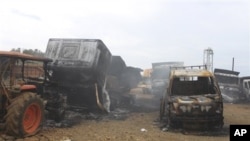Communists have owned up to raiding three mining facilities in the southern island of Mindanao in the Philippines this week. The show of force comes as the umbrella organization of the country’s leftist groups is in peace talks with the government.
According to military officials, at least 200 members of the New People’s Army (NPA) attacked two mines of Nickel Asia Corporation, which is partly owned by a Japanese mining firm, and another metal mining subcontractor.
They say the group temporarily held some mining executives hostage and torched an office building along with scores of pieces of heavy equipment.
Researcher Rodolfo Mendoza with the Philippine Institute for Peace, Violence and Terrorism Research calls the attacks significant. He says an organized effort of this scale means the group is poised for warfare.
“What they have demonstrated is a capacity to launch a coordinated and synchronized tactical operation against clusters of mining companies and they appear to be undetected," says Mendoza. "And so they enjoy the mass-based support in nearby municipalities.”
Mendoza, a retired director of the Philippine National Police, also notes that in recent months the NPA has stepped up attacks on regional police offices and the military.
President Benigno Aquino called an emergency security meeting and ordered beefed up security in the mining sector. The president has been touting the mining potential in the southern island of Mindanao, which is currently worth about $3.8 billion. The government projects increased mining investment could reach $18 billion by 2016.
But this could only happen if the region is stable, which is why the Aquino administration has been pushing peace negotiations with the leftists. The two sides resumed talks this year, but negotiations came to a standstill in June.
The president’s spokesman, Edwin Lacierda, says the attacks on the mines did not help matters.
“It undermines the peace process. On our end, we have been doing confidence-building measures and on the side of the rebels, they’ve been doing confidence-erosion measures,” says Lacierda.
The leftist group’s head peace negotiator Luis Jalandoni called it a “positive action.”
“Such action should give a signal to the government of Aquino that his mining policies which go for investments but do not regard properly the livelihood and the health and welfare of the indigenous communities and do not give proper attention to the protection of the environment that he should consider changing it,” he said.
Jalandoni says the leftists’ proposal in peace negotiations includes a solution to their demand for more equitable economic benefits from the region’s natural resources.
Military officials question the rebels’ sincerity in their concern for the environment and natural resources. They contend these attacks are carried out because the multinational corporations have refused to pay what they call “revolutionary taxes.” Security and risk analysts in the Philippines say it is common practice for international companies to give money to the rebels in exchange for sparing their businesses from attack.
The Communist Party of the Philippines has been fighting multinational interests in the country for more than 40 years.




